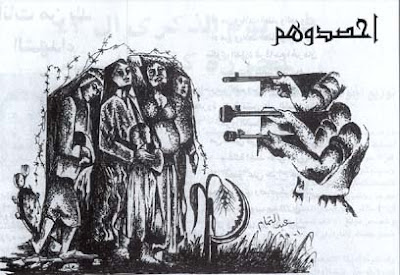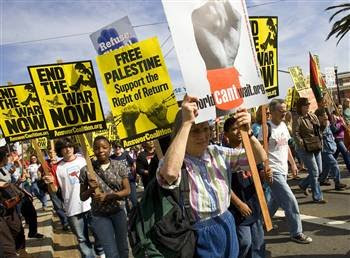Wednesday, October 31, 2007
Palestine Reaps Bitter October Harvests
 Abdalkarim Freij, 14, one of the "harvested" of Kafr Qasem in 1956
Abdalkarim Freij, 14, one of the "harvested" of Kafr Qasem in 1956The massacre and the trial that followed it have become milestones in the
national psyche of Israeli society and have instilled in generations of
commanders and soldiers a moral border one should abide by.
The Jews gathered all the people on the Bayader and the second massacre
started, shooting at the people and over their heads and randomly to terrorize
them, then later chose more than 70 young men, Blind Folded them, and executed
them by firing heavily on them, killing the seventy young men. That is in
addition to four women and a girl were raped in front of all people. Also
Shehadeh and Saleem eye-witnessed their uncle Abd Ahmad Shraydeh killed by an Israeli soldier with an Axe dividing his head immediately into two parts sending
him to death instantly.Israel continues to "harvest" Palestinians. According to Palestine Center for Human Rights, from October 18-24
7 Palestinians, including 2 children, were killed by IOF.
3 of the victims, including a civilian, were extra-judicially executed by IOF.
A Palestinian worker was run down to death by an Israeli settler.
16 Palestinians, including 3 children, a woman and a journalist, were wounded by IOF.
IOF conducted 27 incursions into Palestinian communities in the West Bank and 3 ones into the Gaza Strip.
IOF arrested 37 Palestinian civilians, including 4 children, in the West Bank and 4 others in the Gaza Strip.
IOF razed at least 150 donums of agricultural land Beit Hanoun town in the northern Gaza Strip.
IOF have continued to impose a total siege on the OPT.
IOF have isolated the Gaza Strip from the outside world and a humanitarian crisis has emerged.
A patient died due to the obstruction by IOF troops at Erez crossing of his access to an Israeli hospital.October has been yielding bitter harvests for Palestine for sixty years now.
Sunday, October 28, 2007
Free Palestine, Support the Right of Return
Wednesday, October 24, 2007
Making Room for Florida Immigrants to Palestine
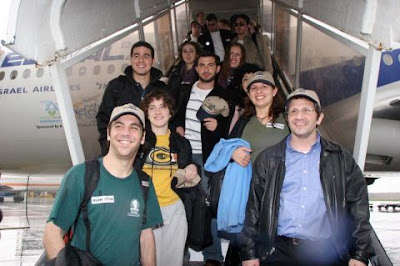
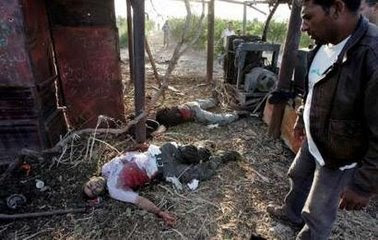
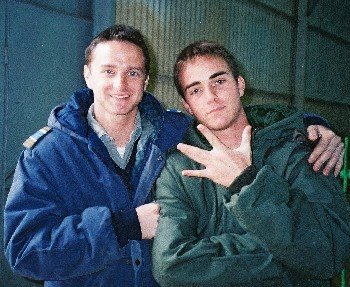
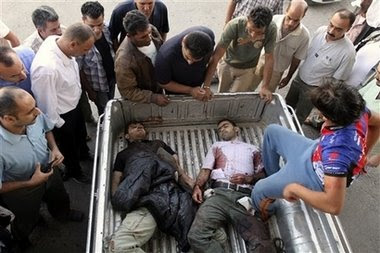 Israel murdered these two boys from Jenin on October 23 to make room for Jon Schwartz (photo second from bottom) of Florida and the other supremacist immigrants from North America pictured above. Indigenous Palestinians are caged, murdered, ethnically cleansed, starved and humiliated so that privileged Zionist Jews from all over the world may thrive on stolen property and come and play soldier. Tell me why 7.2 million Palestinian refugees should accept that any Jew from anywhere in the world who has never set foot in Palestine may become an automatic citizen when Palestinians are denied their universal right to return to their actual property and homes.
Israel murdered these two boys from Jenin on October 23 to make room for Jon Schwartz (photo second from bottom) of Florida and the other supremacist immigrants from North America pictured above. Indigenous Palestinians are caged, murdered, ethnically cleansed, starved and humiliated so that privileged Zionist Jews from all over the world may thrive on stolen property and come and play soldier. Tell me why 7.2 million Palestinian refugees should accept that any Jew from anywhere in the world who has never set foot in Palestine may become an automatic citizen when Palestinians are denied their universal right to return to their actual property and homes.Saturday, October 20, 2007
Anywhere But Home
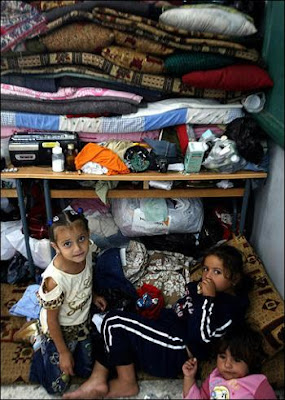 Young Palestinian refugees [refugees from the Refugee Camp Nahr Al-Bared] rest on mattresses in a school classroom in Beddawi [Refugee Camp]. Said a seventy-year old Palestinian woman who took refuge from Nahr Al-Bared and who is leaving the Beddawi camp: "I am relieved that we are leaving, but where do we go now?"
Young Palestinian refugees [refugees from the Refugee Camp Nahr Al-Bared] rest on mattresses in a school classroom in Beddawi [Refugee Camp]. Said a seventy-year old Palestinian woman who took refuge from Nahr Al-Bared and who is leaving the Beddawi camp: "I am relieved that we are leaving, but where do we go now?"Maybe she'll go to Brazil. At least one hundred Palestinian refugees who were living in Iraq because they were ethnically cleansed from Palestine have been resettled in Brazil while 237 Brazilian Jews immigrated to historic Palestine in 2004.
If one is Jewish, according to Israel's Law of Return, one becomes an automatic citizen upon arrival in historic Palestine, no matter from where one comes. But if one is a Palestinian refugee, one of 7.2 million due to the establishment of the so-called "Jewish" state on top of Palestine, one may, if one's lucky, escape a refugee camp on Jordan's border, and go to Brazil. Seems as if anywhere is OK for the Palestinian . . . anywhere except home.
Wednesday, October 17, 2007
Academic Freedom at Risk on Campus
GUEST COLUMNIST
"Academic colleagues, get used to it," warned the pro-Israel activist Martin Kramer in March 2004. "Yes, you are being watched. Those obscure articles in campus newspapers are now available on the Internet, and they will be harvested. Your syllabi, which you've also posted, will be scrutinized. Your Web sites will be visited late at night."
Kramer's warning inaugurated an attack on intellectual freedom in the U.S. that has grown more aggressive in recent months.
This attack, intended to shield Israel from criticism, not only threatens academic privileges on college campuses, it jeopardizes our capacity to evaluate our foreign policy. With a potentially catastrophic clash with Iran on the horizon and the Israeli-Palestinian conflict spiraling out of control, Americans urgently need to be able to think clearly about our commitments and intentions in the Middle East. And yet we are being prevented from doing so by a longstanding campaign of intimidation that has terminated careers, stymied debate and shut down dialogue.
Over the past few years, Israel's U.S. defenders have stepped up their campaign by establishing a network of institutions (such as Campus Watch, Stand With Us, the David Project, the Israel on Campus Coalition, and the disingenuously named Scholars for Peace in the Middle East) dedicated to the task of monitoring our campuses and bringing pressure to bear on those critical of Israeli policies. By orchestrating letter-writing and petitioning campaigns, falsely raising fears of anti-Semitism, mobilizing often grossly distorted media coverage and recruiting local and national politicians to their cause, they have severely disrupted academic processes, the free function of which once made American universities the envy of the world.
Outside interference by Israel's supporters has plunged one U.S. campus after another into crisis. They have introduced crudely political -- rather than strictly academic or scholarly -- criteria into hiring, promotion and other decisions at a number of universities, including Columbia, Yale, Wayne State, Barnard and DePaul, which recently denied tenure to the Jewish American scholar Norman Finkelstein following an especially ugly campaign spearheaded by Alan Dershowitz, one of Israel's most ardent American defenders.
Our campuses are being poisoned by an atmosphere of surveillance and harassment. However, the disruption of academic freedom has grave implications beyond campus walls.
When professors Stephen Walt and John Mearsheimer drafted an essay critical of the effect of Israel's lobbying organizations on U.S. foreign policy, they had to publish it in the London Review of Books because their original American publisher declined to take it on. With the original article expanded into a book that has now been released, their invitation to speak at the Chicago Council on Global Affairs was retracted because of outside pressure. "This one is so hot," they were told. So although Michael Oren, an officer in the Israeli army, was recently allowed to lecture the council about U.S. policy in the Middle East, two distinguished American academics were denied the same privilege.
When President Carter published "Palestine: Peace not Apartheid" last year, he was attacked for having dared to use the word "apartheid" to describe Israel's manifestly discriminatory policies in the West Bank.
As that case made especially clear, the point of most of these attacks is to personally discredit anyone who would criticize Israel -- and to taint them with the smear of "controversy" -- rather than to engage them in a genuine debate. None of Carter's critics provided a convincing refutation of his main argument based on facts and evidence. Presumably that's because, for all the venom directed against the former president, he was right. For example, Israel maintains two different road networks, and even two entirely different legal systems, in the West Bank, one for Jewish settlers and the other for indigenous Palestinians. Those basic facts were studiously ignored by those who denounced Carter and angrily accused him of a "blood libel" against the Jewish people.
That Israel's American supporters so often resort to angry outbursts rather than principled arguments -- and seem to find emotional blackmail more effective than genuine debate -- is ultimately a sign of their weakness rather than their strength. For all the damage it can do in the short term, in the long run such a position is untenable, too dependent on emotion and cliché rather than hard facts. The phenomenal success of Carter's book suggests that more and more Americans are learning to ignore the scare tactics that are the only tools available to Israel's supporters.
But we need to be able to have an open debate about our Middle East policy now -- before we needlessly shed more blood and further erode our reputation among people who used to regard us as the champions of freedom, and now worry that we have come to stand for its very opposite.
Saree Makdisi is a professor of English and Comparative Literature at UCLA and a frequent commentator on the Middle East.
© 1998-2007 Seattle Post-Intelligencer
Tuesday, October 16, 2007
October
Sunday, October 14, 2007
Emily Jacir's Photo Essay of the Bethlehem Ghetto [Final]
(Emily Jacir)
This is Hebron's old market. The last time I was here was in 2000. It was a bustling commercial and cultural area then. Now it is a ghost town. The city of Hebron is surrounded with checkpoints, road blocks and military barriers cutting roads leading to other parts of the city. The most violent settlers in the West Bank live in the center of Hebron in homes they stole from Palestinians. They routinely attack Palestinians in an effort to get them to leave. They are heavily guarded by 2,000 members of the Israeli army. (Emily Jacir)
Saturday, October 13, 2007
Emily Jacir's "A Photo Essay of the Bethlehem Ghetto" Part III
Emily Jacir's "A Photo Essay of the Bethlehem Ghetto" Part II
Emily Jacir's "A Photo Essay of the Bethlehem Ghetto" [Part 1]
Labels: asmlro
Monday, October 08, 2007
Go And See the Truth For Yourself, I Did
British Medical Journal October 7, 2007
I have been following the debate in these columns with a mixture of interest and incredulity. I wonder how many of those who accuse Tom Hickey and Derek Summerfield of 'anti-Israel bias' and 'anti-Semitism' have actually visited the West Bank or Gaza to see the facts for themselves. I had the good fortune to visit Israel and the West Bank for two weeks in August. What I saw there changed my life forever.
We spent a lot of time at checkpoints in the West Bank. Unfortunately, the word 'checkpoint' sounds so benign that it hardly conveys the horror of the place. Have you seen a cattle shed crammed full of animals? With only one gate to get out, guarded by a farmer with a stick? Well, just replace him with an Israeli soldier with a rifle- and the animals with Palestinians- and you're not far. At Huwwara checkpoint near Nablus, we saw a queue extending for half a kilometre out of the cramped shed and into the merciless sun. One by one, the Palestinians were called forward and their documents inspected. Some got through, others were turned back. Depending on the mood of the soldier. The explanation given for the checkpoints- 'security'- is a lie, as the barriers mostly stand between Palestinian cities and towns, not between Palestine and Israel.
Israel, through its system of 700 checkpoints, roadblocks and earth mounds in the West Bank strangles the Palestinians' freedom of movement. 68 women have been forced to give birth at checkpoints since the year 2000 (www.ifamericansknew.org). Half of the babies involved have died, as have 4 of the women. Many of the babies born have suffered irreversible brain damage. Imagine being the helpless husband or son of a woman forced to endure the pain of labour on the baking earth at a checkpoint- with an armed soldier looking on- and you will begin to understand how suicide bombers are born.
18000 houses have been demolished by Israel since 1967, often over the heads of their inhabitants (Israeli Committee Against House Demolitions- www.icahd.org). The reason given again? The big lie- security. The truth is that even if a Palestinian owns a piece of land, to build or extend an existing dwelling on it, he must put in an application costing $20000. This is almost uniformly rejected, and as his family grows, he is forced to build illegally. Then in come the bulldozers. The Palestinian then has to clear the rubble themselves and pay the Israeli government for the cost of demolishing his house.
There have been several references in these columns to the attempted terrorist attacks by Muslim doctors in Britain. Such people would do well to remember that the first 'doctor terrorist' was Jewish- Baruch Goldstein, who gunned down 29 Palestinians at prayer in the city of Hebron in 1994, injuring 150 others. A shrine to Goldstein has been erected in the fanatical settlement of Kiryat Arba- a plaque there reads: "To the holy Baruch Goldstein, who gave his life for the Jewish people, the Torah and the nation of Israel". It has become a pilgrimage site for those with extreme right-wing views.
In the old city of Hebron, 400 fanatical settlers- protected by Israeli Defence Force soldiers- hold 30000 Palestinians to ransom. They stone and kick the inhabitants, while the Israeli army forbids Palestinians to drive- in some areas, even to walk- on the streets. I saw for myself the concrete blocks, rubbish and human excrement thrown down onto passing Palestinians by the illegal settlers occupying the flats above Arab shops. The racist graffiti is shocking:
- 'Arabs to the gas chambers!' - 'Watch out Fatima, we will rape all Arabs!' - 'Mohammed is a pig'. Below this is a drawing of a pig reading the Quran. - 'If you Arabs had just used a f***ing condom, then none of this would have happened!'
(If anybody finds this unbelievable, give me your email address and I shall be all too happy to send you photographic evidence.)
Walking through old Hebron, you pass row upon row of abandoned shops with their doors welded together and spray-painted with the Star of David. The resonance of the Warsaw ghetto is chilling.
As for the stance that Israel is the 'only democracy in the Middle East' and 'treats all its citizens equally', I invite you to visit the Negev desert in Israel. The Israeli organization Physicians for Human Rights (www.phr.org.il) told us of the plight of Bedouins there. There are 60 villages which have existed before 1948, the existence of which Israel does not recognize. As a result they have no healthcare, electricity or clean water. Their infant mortality rate is 7 times the Israeli average- in the 4th richest country in the world, with possibly the best healthcare system anywhere.
Those who grieve at the potential loss of academic freedom that a boycott of Israel may cause would do well to learn about the violation of Palestinian academic freedom. We visited Birzeit University just outside Ramallah. There we were told by Yasser Darwish, the Public Relations officer for the institution, how during the Second Intifada the Israelis constructed a checkpoint between Ramallah city and Birzeit. This checkpoint was nothing but a series of earth mounds, piles of rubble and huge rocks stretching for a mile and a half- with the sole purpose of obstructing the passage of people. This was not all- people trying to reach the University by walking around the obstacles were often greeted with beatings, rubber bullets and teargas. Sometimes students and teachers would be allowed to go to Birzeit in the morning but the checkpoint would be completely closed in the afternoon when it was time to go home. 5000 students and teachers would then have to take a circuitous route over hills and through valleys to get home- this would take upto 2 hours.
Students- including females- were subjected to humiliating body searches. Soldiers stormed the women's dormitories on several occasions, breaking windows, doors and furniture. Electricity, water and telephone lines in Birzeit and Ramallah were cut off, isolating people from the outside world.
Healthcare is not a 'basic human right' in Palestine. It is incredible that some people have been highlighting the graciousness of Israel in agreeing to treat wounded and ill Palestinians. Under the Geneva conventions, an occupying power has responsibility for the health of the people it occupies.
In Nablus, we visited Rafidia Hospital, the main general hospital. We were met by Dr Sadaqah, the Deputy Director. He told us that each time the Israelis invade Nablus, the first thing they do is to encircle the hospital, preventing the passage of staff and patients and resulting in unnecessary deaths. Sometimes patients need to be transferred to hospitals in Jerusalem or Israel- however the Israeli authorities create hurdles at every opportunity. Often by the time permission is obtained (a minimum of 2 days even for an emergency), the patient dies- this happened to a burns patient two days before our visit.
At the height of the 2002-2003 invasions and curfews, Rafidia received 8-9 cases of serious injuries every day. Staff ended up living in the hospital for 23 days. The Israeli army prevented casualties from the Old City from going to Rafidia- a clinic was set up in a mosque in the Old City to deal with them. Dr Sadaqah told us that this clinic had to perform two emergency amputations without anaesthesia. The Israelis would also prevent bodies from being taken for burial- as a result the hospital morgue overflowed and ice-cream trucks had to be used to store the bodies.
He also told us that the Israelis would regularly enter the hospital, and actually removed 4 patients from their beds. One of these was actually an intensive care patient who had just returned from major surgery. When the doctors and nurses asked for reasons, they were simply pushed aside. We were horrified to learn that when the soldiers removed patients from the hospital, they were accompanied by Israeli doctors who never tried to stop this happening. The soldiers would often remove patients from ambulances while they 'checked' them.
Do you hear the Israeli Medical Association protesting against these gross violations of human rights by Israel?
I had the good fortune to interview two students from Al Quds University Medical School in Jerusalem. To understand the unique situation that al-Quds students- and indeed all Palestinian Jerusalemites- face, it is important to revisit 1967 when Israel occupied the West Bank and Gaza, and illegally annexed East Jerusalem. Israel declared Jerusalem to be 'the unified capital of Israel'; a position not recognized by the international community, including the United States.
The Palestinian residents of Jerusalem were offered Israeli citizenship- however this entailed pledging allegiance to Israel. Unsurprisingly, most of them declined. They were therefore declared 'residents' without citizenship, and are obliged to carry blue Jerusalem ID cards. The space next to 'Nationality' on these cards is blank. The residents of the West Bank, in contrast, carry green ID cards.
Blue ID holders cannot travel to the West Bank, and those with green ID cannot enter Jerusalem. This situation has divided families- including married couples. If a Jerusalem resident marries a West Bank Palestinian, it is forbidden for them to live together either in the West Bank or Jerusalem. As a result, many couples live illegally, in constant fear that one of them will be discovered and expelled. The only precedent to this obscene situation is that of South Africa under apartheid.
The students explained that the campus of the medical school is located in the Jerusalem suburb of Abu Dis. The main teaching hospital- Maqassed- is in the city proper. You used to be unable to tell where Abu Dis ended and Jerusalem started. Not any more. Israel's Separation Wall has separated the two and for all practical purposes, Abu Dis is now in the West Bank.
One of the students told us that of the 40 students in his year, 5 have blue ID and the rest green. You can imagine the consequences. To go to Maqassed for their training, students with green ID need a special permit- which is very difficult to obtain. Even those who manage to get one can never be sure they will make it to the hospital as they are frequently turned away at the checkpoint for no reason. Therefore most green ID students are forced to travel to West Bank hospitals for their clinics- across more checkpoints.
The converse situation is that blue ID students may be able to attend clinics but are often stopped from going to lectures in Abu Dis. And this is no straightforward trip- a journey that should take no more than ten minutes can last an hour and a half due to checkpoints and the circuitous route the students have to take.
When they do manage to qualify, al-Quds doctors are prohibited from working in hospitals in Jerusalem and Israel as their qualification is not recognized by Israel. The West Bank hospitals are only an option for those with green ID. This situation forces many to go abroad.
As for those who claim that Israel, with its violations of human rights, is 'merely defending itself', I would like to bring to your attention the following statistic from the BBC: In 2006, 660 Palestinians were killed by Israeli 'security' forces. These included 141 children. The total number of Israelis killed by Palestinians in 2006? 23. Follow the link below for the story:
http://news.bbc.co.uk/1/hi/world/middle_east/6215769.stm
Now that I am back in the UK- and have opened my mouth in these columns- I know I shall be accused of being anti-Semitic. This is intellectually bankrupt nonsense. I have many Jewish friends in Britain, and now in Israel as well. They are disgusted at what Israel is doing, and are fighting a brave and often dangerous battle, sometimes at the expense of being ostracized by family and friends. The leading critics of Israeli policy- Noam Chomsky, Amira Hass, Ilan Pappe, Norman Finkelstein, the late Tanya Reinhart- are all Jewish.
This is not a centuries-old Jews versus Muslims conflict. (Also remember- 12% of Palestinians are Christians, and this number includes leading figures like Hanan Ashrawi and the late Edward Said.) It is a matter of basic human rights. If one is criticizing house demolitions, checkpoints, extrajudicial executions etc, and one is accused of being anti-Semitic, then the accuser is bizarre indeed. In order for these criticisms to be anti-Semitic, the accuser has to accept those violations of international law as inherent characteristics of Judaism. So who is being anti-Semitic here?
Another question I am likely to be asked is, 'There are so many conflicts in the world today- why are you so obsessed with Palestine?' In case you hadn't guessed by now, justice for Palestine is the key to peace in the Middle East. It is a festering sore in the flesh of every Arab; the longer it goes on, the more resentful of the West they become.
Yes, there are many terrible conflicts like Darfur, Somalia, the Congo, Chechnya and Kashmir. But these are relatively recent, while the oppression of the Palestinians has been going on for 60 years. It is the longest ongoing occupation in the world today- and the only one apart from Iraq. And the only one where the oppressor is being financed and armed to the teeth by the 'civilized' world.
You may wonder what all this has got to do with the debate over a boycott. Well, despite individual dissenting voices, it is clear that Israeli academia and the Israeli Medical Association have failed to come out as a body and condemn the occupation. This is despite repeated calls by Palestinian, Israeli and international human rights organizations. By their silence, they are complicit in human rights abuses- I have no choice but to campaign for a boycott.
The 'exchange of ideas' has led nowhere- despite years of talks at governmental level, a just peace for the Palestinians remains a distant dream. It is time for people in other countries to adopt measures to stigmatize Israel, something which their governments refuse to do. There is a precedent- South Africa. Given the fact that many prominent South Africans- including Nelson Mandela, Ronnie Kasrils and Desmond Tutu- have publicly said that Israel's oppression of the Palestinians is far worse than South Africa under apartheid- why the hesitation to enforce a boycott?
As for those who sympathize with the Palestinians but are against boycotts, I have a simple question- in that case, what are they going to do for the Palestinians- whom the world has boycotted and abandoned for so long? If the academic freedom of Israelis is sacred, should that not apply to Palestinians as well?
Asad Khan, Specialist Registrar, Respiratory Medicine Wythenshawe Hospital, Manchester, M23 9LT
For a full account of my trip, please visit
http://chestdocinpalestine.blogspot.com/
Competing interests: I am a Muslim who refuses to be labelled an anti-Semite simply for criticizing the oppressive policies of the Israeli state
Wednesday, October 03, 2007
تميم البرغوثي ... في القدس
تميم البرغوثي ... في القدس
In Al-Quds
“In Jerusalem”
By: Tamim Al-Barghouti
Translated by: Adib S. Kawar
By our lover's house we passed but we were turned away…
By the enemy's laws and walls
A blessing it could be for me I said…
When you see it, what do you see?
What you cannot bear is what you see…
When from the side of the road its houses appear…
When every soul sees its lover …
And every absentee surrenders to happiness…
To see him before their meeting is her secret as much as it is his…
Even her happiness does not give her safety…
When old Al-Quds you see once…
When the eye shall see it, where ever it turns the eye shall see it…
In Al-Quds… a cabbage vender from Georgia…
Tiring of his wife… a holiday he plans or his walls he shall paint…
In Al-Quds a Torah and an old man from upper Manhattan did come…
Its codes and rules a Polish kid teaches…
In Al-Quds an Abyssinian policeman closes a road in the market…
A machinegun on a twenty years old settler’s shoulder is carried…
A skullcap greeting the Wailing Wall…
Blond European tourists, Al-Quds they never see…
Photos they take for each other or with a reddish woman vender…
In Al-Quds soldiers with their boots as if over the clouds they creep…
In Al-Quds on the asphalt we prayed…
In Al-Quds. Others are in Al-Quds, except you…
History stirred at me smiling…
To see somebody else or err you thought???
Here they are facing you, they are the writing, and you are the margin …
O son... a veil you thought your visit from city’s face you shall remove…
To see from under it the hard reality of Al-Quds…
In Al-Quds everybody is there except you…
The city’s epoch is two epochs…
A foreign epoch steps in tranquilly, it doesn’t change…
As if in sleep it is walking…
And there is another one, latent and veiled…
Avoiding the foreign it is without sound walking…
Al-Quds knows itself…
Ask any creature, and then all shall indulge you…
With a tongue everything in the city is, when you ask it shall disclose…
In Al-Quds the crescent is like an embryo more vaulting it becomes…
Hunched-like it rests over domes…
Through the years relations developed…
The father’s relations with his children…
In Al-Quds buildings’ stones are citations from the Koran and the Gospels…
In Al-Quds beauty’s identification is octagonal and blue…
A golden dome looking like a curved mirror on top of it…
Synopsized in it you see the sky’s face…
Coddled and brought near…
Distributed like relief bags for the needy under siege…
After the Friday sermon of a people
For help open their hands…
In Al-Quds the sky got mixed with the people, we protect it, it protects us…
On our shoulders we always carry it…
If time aggrieves its moons…
In Al-Quds as if like smoke is the texture of the swarthy marble pillars…
Overtops mosques, churches and windows…
The morning’s hand it holds to show its colored engraving…
He says: “no it is like this”…
She replies: “no like this it is”…
If disagreement lengthy it becomes… they partake…
Because outside the threshold the morning is free…
But to enter if he wants, he has to accept God’s judgment…
In Al-Quds a school there is for a Mamluke* from beyond the river he came…
In an Asfahan slave market they sold him…
To a Baghdadi merchant…
To Aleppo he came, its amir frightened he became of the blueness in his left eye…
To a caravan going to Egypt he was given…
To become years later the Mongol’s defeater and the sultan…
In Al-Quds a smell there is, which establishes Babylon and India in a perfumer’s shop…
By God a language it has, you will understand if you listen…
And it tells me when tear gas bombs they shoot at me: “Don’t worry…”
Defused it gets when the smell of the gas wanes to tell me: “Did you see”…
In Al-Quds contradictions and miracles at ease it becomes and God’s people won’t deny…
As if cloth pieces new and old they check…
Wonders there by the hand are felt…
In Al-Quds an old man’s hand you shake…
Or a building you touch…
A poem or two, you, the son of the noble, on your hand palms you shall find incised…
In Al-Quds in spite of the chain of nakabat (tragedies) a smell of childhood there is in the wind…
The wind of innocence…
In the wind between two bullets, pigeons you shall see flying announcing a state …
In Al-Quds graves arrayed in lines they are, as if lines they are in the city’s history and the book is its soil…
Everybody passed from here…
Al-Quds accepts anybody who visits it whether infidel or believer he is…
In it I pass and its tombstones I read in all the world’s languages…
In it there is African, European, Kafjaks, Syklabs, Bushnaks, Tartars, Turks, and God’s peoples.
The doomed, the poor, landlords, the dissolute, and hermits…
In it there is whoever treaded on the earth…
Do you think it could hardly provide us alone with living???
O you history writer what happened to exclude us alone…
You old man, again reread and rewrite… mistakes you committed…
The eye shuts and opens…
Left wise the yellow car driver turned…
Away from Al-Quds’ gate…
Al-Quds we bypassed…
The eye sees it in the right mirror…
Its colors changed before sunset…
If a smile surprises me...
How it sneaked in between tears I don’t know, she told me when I went far too far…
“You weeper behind the wall… fatuous you are?
Are you mad… Your eye shouldn’t cry, you forgotten one from the book’s text…
You Arab your eye shouldn’t cry… You should know that…
In Al-Quds, all mankind is in Al-Quds but I see nobody in Al-Quds except you…”
*Mamluke: A slave from Egypt
Translated from Arabic by Adib S. Kawar and revised by Mary Rizzo, members of Tlaxcala
We Will Not Be Silenced
Palestinian academics received with dismay, although not entirely with surprise, the decision by the University and College Union (UCU) to cancel their UK speaking tour, during which they had planned to discuss the academic boycott of Israel with colleagues at British universities.
Citing legal advice, the union released a statement saying that "while UCU is at liberty to debate the pros and cons of Israeli policies, it cannot spend members' resources on seeking to test opinion on something which is in itself unlawful and cannot be implemented". Debating effective means of countering Israeli colonial policies has thus been declared illegal.
We believe that this ban on debating the Israeli academic boycott has deprived our British colleagues of an opportunity to better inform themselves about an issue that is of concern to conscientious academics and intellectuals the world over. The complicity of the British government, among others, in Israel's continued military occupation and persistent violation of international law makes it all the more relevant for British civil society, academics included, to rationally deliberate on its moral responsibility in countering injustice.
We are disappointed to see that the leadership of the UCU has failed to defend the right of its members to engage in unfettered discussions on this or any other matter of concern to academics. Open debate, after all, is one of the key foundations of academic freedom, and thus we cannot understand why the door to open consideration of controversial ideas has been so abruptly closed.
Palestinian academic unions will continue to pursue other avenues to make our case heard in the academic community in the UK, and shall not be deterred by the cancellation of the invitation extended to us by the UCU. While we do not have the resources of the Israel lobby in the UK, we do think that fair-minded British academics will be willing to listen to our case and give it thoughtful consideration. Truth is stronger than power, and we trust in the integrity of British academics to know that instinctively.
In fact, we can detect the not-so-hidden hand of that lobby in this latest episode of stifling debate on issues pertaining to Israeli policies and the complicity of the Israeli academy in perpetuating them. Given that the same suppression of academic freedom has been proliferating among US campuses for quite some time, one cannot escape the conclusion that an abhorrent wave of new McCarthyism has perhaps crossed the pond.
By resorting to bullying, censorship and intimidation, however, the Israel lobby in the US and UK, supported by the Israeli government and academic establishment, is declaring its definitive loss of confidence in its own ability to rationally refute the case for an academic boycott against Israel.
By muzzling debate and free discussion on the boycott, the lobby and its supporters within the UCU are suppressing academic freedom in the most crude manner. They are proving once again that they were never concerned about the alleged "infringement" of the boycott on academic freedom; rather, their only concern has always been how to shield Israel's unique form of apartheid from scrutiny and censure. Their aim has been to protect the Israeli academy from damning accusations of complicity in maintaining Israel's oppression of all Palestinians, academics and students included.
We think that UCU members are aware of the significant role played by the union's predecessor, the Association of University Teachers, in upholding academics' commitment to justice in a historical precedent. During the struggle against the apartheid regime in South Africa, British academics were at the forefront of boycotts of the racist state. We do not see why considering ways of fighting Israel's unique yet equally pernicious form of apartheid should be subject to different considerations.
We appreciate the sentiments expressed in the UCU statement about finding a way of opening a dialogue with the Palestinian academic community on building solidarity. The best form of solidarity with Palestinians is direct action aimed at bringing an end to the occupation and the regime of apartheid in Palestine. Isolating Israel in the international arena, through various forms of boycott, divestment and sanctions, and forcing it to obey international law and to respect Palestinian rights, are among the most effective and morally sound strategies open to international civil society. We are confident that our British colleagues will begin to realise that true solidarity with Palestinian academics requires a political commitment to bringing about an end to oppression and injustice.
Needless to say, the boycott campaign will not only continue, but is likely to gain public support among western academics in particular; the true face of the anti-boycott camp has been exposed as a McCarthyist front that unabashedly violates the most revered values of academic freedom and open debate.
Amjad Barham is head of the council of the Palestinian Federation of Unions of University Professors and Employees
Monday, October 01, 2007
Inalienable Right to Return Matter of Human Dignity
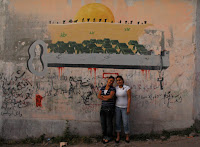 Teenage girls in Dheishe Refugee Camp in front of the key, powerful symbol of the inalienable right of return.
Teenage girls in Dheishe Refugee Camp in front of the key, powerful symbol of the inalienable right of return.